
Charles Edward Anderson Berry was an American singer, guitarist and songwriter who pioneered rock and roll. Nicknamed the "Father of Rock and Roll", he refined and developed rhythm and blues into the major elements that made rock and roll distinctive with songs such as "Maybellene" (1955), "Roll Over Beethoven" (1956), "Rock and Roll Music" (1957), and "Johnny B. Goode" (1958). Writing lyrics that focused on teen life and consumerism, and developing a music style that included guitar solos and showmanship, Berry was a major influence on subsequent rock music.
Chicago blues is a form of blues music that developed in Chicago, Illinois. It is based on earlier blues idioms, such as Delta blues, but is performed in an urban style. It developed alongside the Great Migration of African Americans of the first half of the twentieth century. Key features that distinguish Chicago blues from the earlier traditions, such as Delta blues, are the prominent use of electrified instruments, and especially the use of electronic effects such as distortion and overdrive.

Katy Lied is the fourth studio album by American rock band Steely Dan, released in March 1975, by ABC Records; reissues have since been released by MCA Records due to ABC's acquisition by the former in 1979. It was the first album the group made after they stopped touring, as well as their first to feature backing vocals by Michael McDonald.
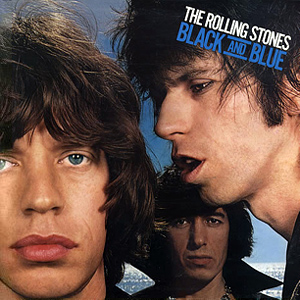
Black and Blue is the thirteenth studio album by the English rock band the Rolling Stones, released on 23 April 1976, by Rolling Stones Records.
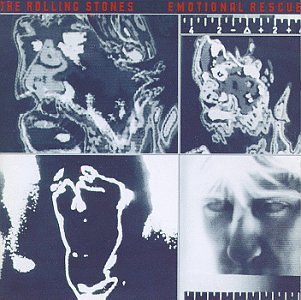
Emotional Rescue is the fifteenth studio album by English rock band the Rolling Stones, released on 23 June 1980 by Rolling Stones Records. Following the success of their previous album, Some Girls, their biggest hit to date, the Rolling Stones returned to the studio in early 1979 to start writing and recording its follow-up. Full-time members Mick Jagger (vocals), Keith Richards (guitar), Ronnie Wood (guitar), Bill Wyman (bass) and Charlie Watts (drums) were joined by frequent collaborators Ian Stewart (keyboards), Nicky Hopkins (keyboards), Bobby Keys (saxophone) and Sugar Blue (harmonica).
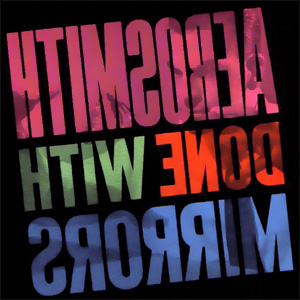
Done with Mirrors is the eighth studio album by American rock band Aerosmith, released on November 4, 1985. It marked the return to the band of guitarists Joe Perry, who left in 1979 and Brad Whitford, who departed in 1981. The band's first album on Geffen Records, it was intended as their ‘comeback’. However, the record failed to live up to commercial expectations despite positive reviews.

Cool for Cats is the second studio album by the English new wave group Squeeze, released in 1979. Cool for Cats contains four UK hit singles, more than any other album the band has issued. The album peaked at number 45 in the UK Albums Chart, spending 11 weeks in that listing.
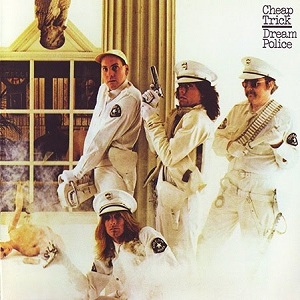
Dream Police is the fourth studio album by American rock band Cheap Trick. It was released in 1979, and was their third release in a row produced by Tom Werman. It is the band's most commercially successful studio album, going to No. 6 on the Billboard 200 chart and being certified platinum within a few months of its release.
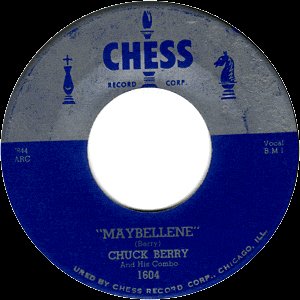
"Maybellene" is a rock and roll song by American artist Chuck Berry, adapted in part from the western swing fiddle tune "Ida Red". Released in 1955, Berry’s song tells the story of a hot rod race and a broken romance, the lyrics describing a man driving a V8 Ford and chasing his unfaithful girlfriend in her Cadillac Coupe DeVille. It was released in July 1955 as a single by Chess Records, of Chicago, Illinois. Berry's first hit, "Maybellene" is considered a pioneering rock and roll song. Rolling Stone magazine wrote of it, "Rock & roll guitar starts here." The record was an early instance of the complete rock and roll package: youthful subject matter; a small, guitar-driven combo; clear diction; and an atmosphere of unrelenting excitement.

Love You Live is a double live album by the Rolling Stones, released in 1977. It is drawn from Tour of the Americas shows in the US in the summer of 1975, Tour of Europe shows in 1976 and performances from the El Mocambo nightclub concert venue in Toronto in 1977. It is the band's third official full-length live release and is dedicated to the memory of audio engineer Keith Harwood, who died in a car accident shortly before the album's release. It is also the band's first live album with Ronnie Wood.

Repeat When Necessary is the fifth album by Welsh rock musician Dave Edmunds. Produced by Edmunds, it was released in 1979 by Swan Song Records. It was recorded and released at the same time as Nick Lowe's Labour of Lust, and features the same lineup of musicians: Edmunds, Lowe, Billy Bremner and Terry Williams.
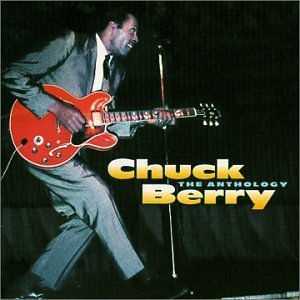
Anthology is a two-disc compilation album by American rock and roll musician Chuck Berry released on July 27, 2000, by Chess Records. It duplicates in its entirety the previous anthology The Great Twenty-Eight ranked at No. 21 on the Rolling Stone 500 greatest all time albums list, as well as the entirety of the later Definitive Collection issued in 2006 as part of the Universal series. The album was later reissued and packaged in 2005 as part of the Universal Records Gold series, and simply retitled Gold. It charted at No. 110 in the UK Albums Chart.

San Francisco Dues is the fifteenth studio album by Chuck Berry, released in 1971 by Chess Records.

The London Chuck Berry Sessions is the sixteenth studio album by Chuck Berry, and consists of studio recordings and live recordings released by Chess Records in October 1972 as LP record, 8 track cartridge and audio cassette. Side one of the album consists of studio recordings, engineered by Geoff Calver; side two features three live performances recorded by the Pye Mobile Unit, engineered by Alan Perkins, on February 3, 1972, at the Lanchester Arts Festival in Coventry, England. At the end of the live section, the recording includes the sounds of festival management trying in vain to get the audience to leave so that the next performers, Pink Floyd, can take the stage; the crowd begins chanting "We want Chuck!". His backing band for that concert included Onnie McIntyre (guitar), Robbie McIntosh (drums), Nic Potter (bass), and Dave Kaffinetti (piano). McIntosh and McIntyre would later form the Average White Band. The studio recordings included pianist Ian McLagan and drummer Kenney Jones from the bands the Small Faces and Faces.

Chuck Berry is the eighteenth studio album by Chuck Berry, released in 1975 by Chess Records. Some pressings of this album carry the title Chuck Berry '75. Berry's daughter, Ingrid, contributed backing vocals.
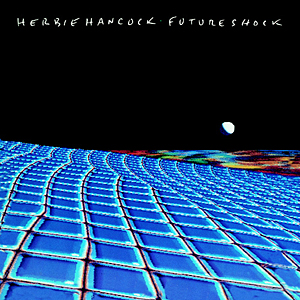
Future Shock is the twenty-ninth album by American jazz pianist Herbie Hancock, released in August 1983 by Columbia Records. It was his first release from his electro-funk era and an early example of instrumental hip hop. Participating musicians include bass guitarist Bill Laswell, guitarist Pete Cosey and drummer Sly Dunbar.

Ronnie Lane's Slim Chance is the second solo album recorded by Ronnie Lane, one of the founders of Small Faces and Faces, after he left Faces to live on a farm in Wales. In homage to his perceived chances of commercial success, he named his band Slim Chance. Six of the thirteen songs on this album were originals written by Lane, the rest of Slim Chance, and Lane's wife, Kate Lambert; the remainder were covers, including a new version of the Faces track "Stone".

I've Got My Own Album to Do is the first solo album by English rock musician Ronnie Wood, released in September 1974. An all-star project recorded outside of his activities with the Faces, it reached number 27 on the UK's NME chart. The album title was thought to be a dig at Rod Stewart, who appeared to be more committed to his solo career than working with the Faces. Wood has said that the title originated from contributors such as George Harrison and Mick Jagger "nagging me to let them go home" and finish their own projects. The album was recorded at The Wick, Wood's house in Richmond, south-west London.

Subtle as a Flying Mallet is the second solo album by Dave Edmunds, principally focused on sound-alike remakes of late 1950s and early 1960s hits. All of the vocals are by Edmunds, and many of the songs are true solo efforts in that Edmunds also plays all the instruments. The album produced two Top 10 singles in the UK, remakes of the Phil Spector hit "Baby, I Love You" and The Chordettes' "Born to Be with You". A 2006 reissue of the album includes two former B-sides as bonus tracks.

Chuck is the eponymous twentieth and final studio album by American rock and roll singer and guitarist Chuck Berry, released in June 2017. Berry died between the announcement of its recording on his 90th birthday in October 2016 and its release. It posthumously became his first UK Top 10 chart entry since 1977, debuting at No. 9. This is the first Berry studio album to be released in almost four decades. It was positively received by critics who considered it a return to form and a poignant last statement.



















